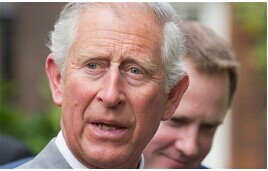
David Blunkett, Minister of Education Reform, said Prince Charles made plain his disapproval of Labor’s decision to concentrate on comprehensive education. “I would explain that our policy was not to expand grammar schools, and he didn’t like that.
“He was very keen that we should go back to a different era where youngsters had what he would have seen as the opportunity to escape from their background, whereas I wanted to change their background.”
There are just 164 grammar schools left in England and 69 in Northern Ireland — down from just under 1,300 under the system’s peak in 1965. The law prevents any more from being built.
Mr Cameron, who was educated at Eton, led to a violent debate within the Conservative party seven years ago after ruling out an expansion of grammar schools, saying parents do not want their children “divided into sheep and goats at the age of 11”.
Instead, the Ministry of Education has sought to encourage the growth of academy schools, which are free to adopt traditional methods but are prevented from selecting pupils on grounds of academic ability.
But David Davis, a former leader of the Conservative party, said it was necessary to develop selective education and win back ambitious lower-middle and working-class people. “Social mobility in Britain today is the poorest it has been in living memory, and one of the main reasons for that is the absence of grammar schools. The raw truth is grammar schools are the best way to give bright youngsters from a poor background a chance,” Mr Davis added.
Chris McGovern, the chairman of the Campaign for Real Education which was set up in the wake of grammar school closures, said a promise by ministers to fund new selective schools would be “hugely popular” with a majority of parents.
Mr Blunkett said he “didn’t mind” the intervention. “If you are waiting to be the king of the United Kingdom … you genuinely have to engage with something or you’d go worried.”
本时文内容由奇速英语国际教育研究院原创编写,禁止复制和任何商业用途,版权所有,侵权必究!
1.Why did Prince Charles disapprove the Labor’s decision?
A The Labor decided to have more grammar schools built.
B Comprehensive education can change youngsters’ background.
C The Labor’s policy was to give the youngsters more opportunities.
D Comprehensive education does no good to poor youngsters’ development.
解析:选D。细节理解题。根据文章第二段…where youngsters had what he would have seen as the opportunity to escape from their background可知,综合教育难以使出身底层的孩子们有机会改变自己的家庭背景。故选D。
2.What caused the argument within the Conservative party?
A Mr Cameron received his education in Eton.
B The 11-year-old children were unable to divide sheep from goats.
C The development of grammar schools was ruled out.
D Academy schools did not select pupils on grounds of academic ability.
解析:选C。细节理解题。根据文章第四段…after ruling out an expansion of grammar schools可知,保守党内部的争论是因为政府关闭文法学校引起的。
3.What is the result of closing grammar schools according to Mr. Davis?
A People from lower-middle and working class lost their chances to move up.
B The lower-middle and working-class people lost their dreams.
C Britain has stopped development in recent years.
D The government has lost its lower-middle and working-class supporters.
解析:选A。细节理解题。根据文章第六段Social mobility in Britain today is the poorest…可知停办文法学校影响了社会的流动性(即由社会底层发展到社会高层)。
4.What can be inferred from the passage?
A Comprehensive education is better than selective education.
B Selective schools benefit the majority of the British society.
C Prince Charles insists that the government build more academy schools.
D Mr. Blunkette finally accepted Prince Charles suggestions.
解析:选B。推理判断题。根据文章第七段…“hugely popular” with a majority of parents可知,精英学校将受到很多家长的欢迎的,由此判断,精英学校对社会的大多人是有益的。
5.What does the underlined word “you” refer to in the last paragraph?
A Chris McGovern.
B Prince Charles.
C Mr Cameron.
D David Davis.
解析:选B。猜测词义题。根据下文的the king of the United Kingdom可知,这里的you指的是查尔斯王子。